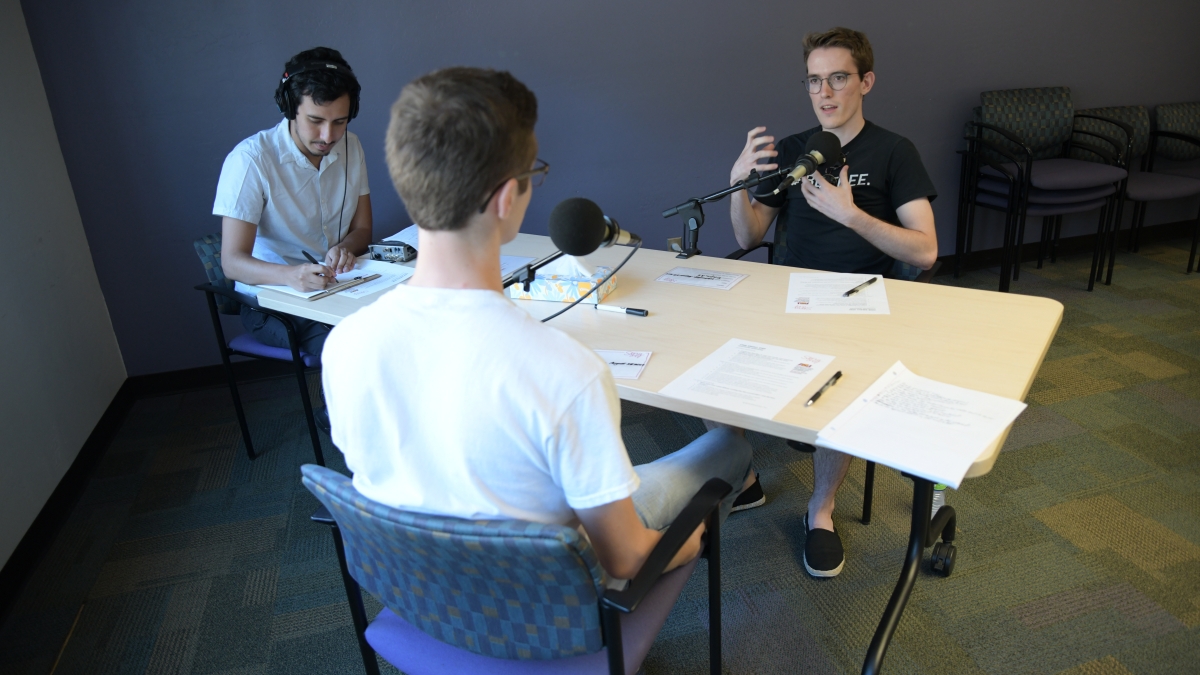Shakespeare was hardly the first to acknowledge mankind’s shared humanity, but the words he used to do so are inarguably enduring.
“If you prick us, do we not bleed?” asked the Jewish character Shylock, imploring his audience in the Bard’s “The Merchant of Venice” to recognize the value in his life as equal to that of the life of a Christian.
It’s a simple yet profound question: Though we all have our differences, do they outweigh our similarities?
Over the course of a week in August, a handful of students at Arizona State University had the chance to reflect on that question when they engaged in one-on-one conversations with someone whose beliefs differed from their own.
Now available to listen to online, their conversations are part of the One Small Step initiative led by national nonprofit StoryCorps, which records, preserves and shares the stories of Americans from all backgrounds and beliefs. ASU’s School of Civic and Economic Thought and Leadership hosted One Small Step at the university to assist with its effort to include student voices in its growing repository.
Aside from institutions of higher education, One Small Step has also partnered with community-based organizations and faith communities to record such conversations.
Video by the School of Civic and Economic Thought and Leadership
“One of our focuses has been working with colleges because students are eager for spaces to … discuss opposing viewpoints in a respectful and structured way,” said Roselyn Almonte, manager for community partnerships for One Small Step.
“We've also been finding that students are often in the process of forming their political opinions in college and often (are) more receptive to listening to opposing viewpoints and learning about different experiences, which creates a richer StoryCorps One Small Step conversation experience.”
Students discussed everything from their family backgrounds to their political influences to their religious beliefs. The resounding theme of their reactions to the experience was that we all have more in common than we don’t.
Religious studies sophomore Jaxon Washburn said he and his conversation partner, Desmond Kumi, a junior in business law, ironically found their similarities lie in their differences.
“He was raised in more of a liberal household but now finds himself more moderate-right-leaning,” Washburn said. “I was raised in a more conservative household, but I find myself now leaning more moderate-left.
“I felt like even though this person was a complete stranger, we were able to have a really good, positive conversation and we were able to unpack our different backgrounds and where we were coming from. I really enjoyed hearing his story.”
Sustainability and geography junior Sakshi Hegde and mathematics sophomore Janani Lakshmanan disagreed about the cost of higher education but bonded over their backgrounds — both are from immigrant families who they say guided their values and beliefs.
“It was interesting because our influences were very similar, but they also made us very different people,” Lakshmanan said.
Hegde said she wanted to participate in the One Small Step conversations because it’s important now more than ever to try to reach across political divides.
“Especially in this day and age, where there's a lot of political polarization, when you hear another person's party or beliefs, you immediately form an assumption about them based on that and then refuse to have a conversation with them,” she said. “I feel like this brings people of different political backgrounds together and allows them to have open, cordial conversations.”
“Not every person you meet is going to agree with you, and you’re not going to agree with every person you meet,” Lakshmanan added. “So if you close yourself off from the world like that, how productive are you going to be as a citizen?”
The pair said they plan to keep in touch going forward.
One of the core tenets behind the founding of ASU’s School of Civic and Economic Thought and Leadership in 2017 was the obligation of institutes of higher education to promote civil discourse and free speech.
Aside from a curriculum that includes two bachelor's degrees and one minor, the school’s programming includes public talks that feature nationally renowned speakers from a variety of political backgrounds.
“[We] started the Civic Discourse Project three years ago to provide a space for robust civil discourse on important issues with speakers across diverse viewpoints, providing examples of civil disagreement to university students and the broader community,” said Paul Carrese, the school’s director.
“Additionally, we hope to use our speaker series and related events as a catalyst for future One Small Step initiatives the school plans to lead on campus.”
Staff at the school underwent training to become facilitators for the program and plan to host future recordings.
Washburn said that not only would he do it again, but that the experience has inspired him to apply what he learned in his everyday life.
“Conversations like this don’t just have to be things we plan out ahead of time through an organization,” he said. “When we’re walking through campus or waiting in line, we don’t have to just listen to our headphones or stare at our phones. Those are opportunities for people to actually talk to each other.
“Essentially what this demonstrated to me is that you can take two absolute strangers, and if you just get them talking, they can have a great conversation that is valuable to both of them. There’s a lot of strangers who don’t have to stay strangers.”
Top photo: ASU political science major Nathanael Hauschild (front center) and history major Clinton Barney record a conversation for StoryCorps' One Small Step initiative on Arizona State University's Tempe campus. Photo by Samantha Lloyd/ASU
More Law, journalism and politics

How to watch an election
Every election night, adrenaline pumps through newsrooms across the country as journalists take the pulse of democracy. We gathered three veteran reporters — each of them faculty at the Walter…
Law experts, students gather to celebrate ASU Indian Legal Program
Although she's achieved much in Washington, D.C., Mikaela Bledsoe Downes’ education is bringing her closer to her intended destination — returning home to the Winnebago tribe in Nebraska with her…

ASU Law to honor Africa’s first elected female head of state with 2025 O’Connor Justice Prize
Nobel Peace Prize laureate Ellen Johnson Sirleaf, the first democratically elected female head of state in Africa, has been named the 10th recipient of the O’Connor Justice Prize.The award,…
